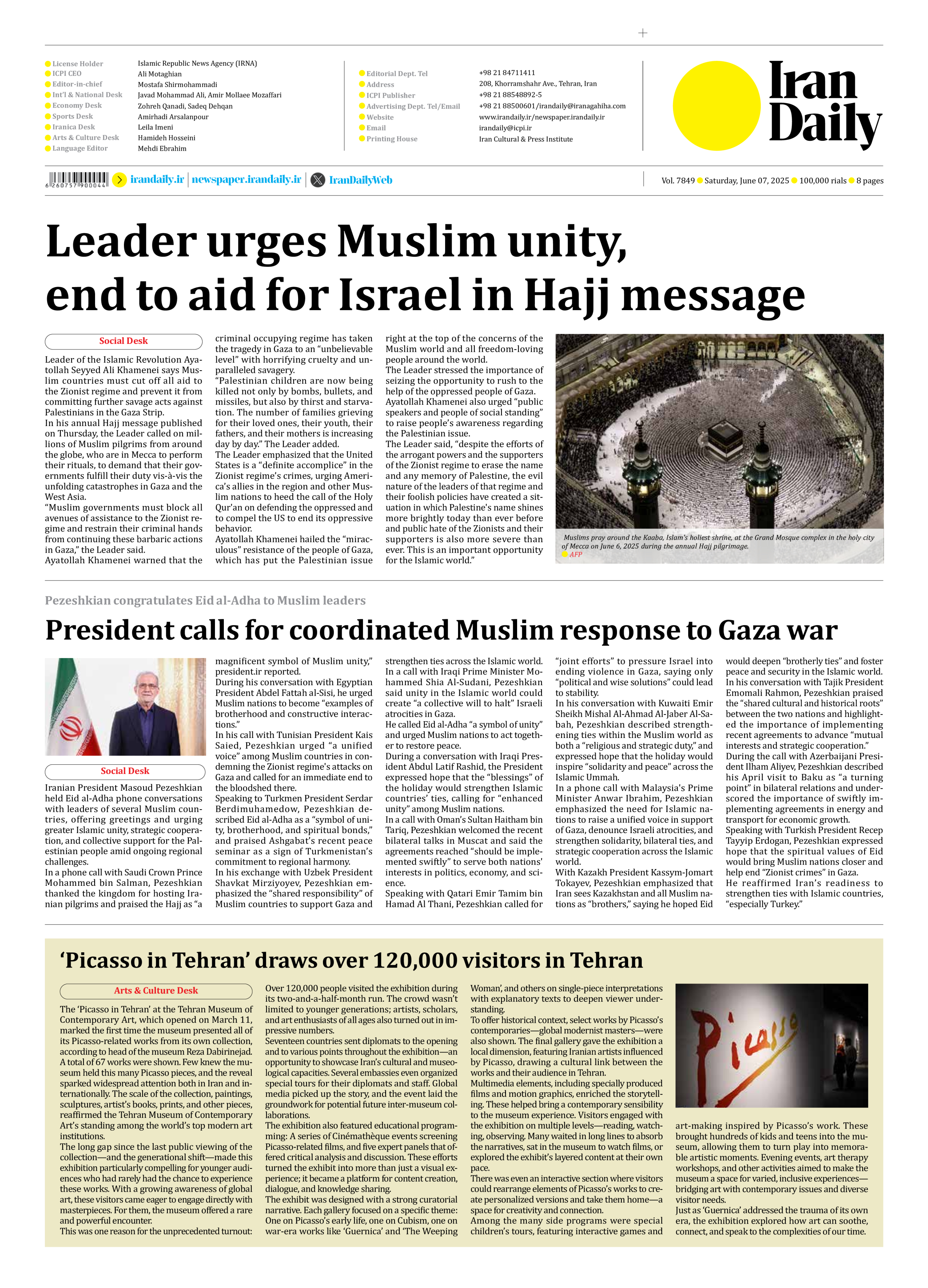
Copy in clipboard...
Pezeshkian congratulates Eid al-Adha to Muslim leaders
President calls for coordinated Muslim response to Gaza war
Iranian President Masoud Pezeshkian held Eid al-Adha phone conversations with leaders of several Muslim countries, offering greetings and urging greater Islamic unity, strategic cooperation, and collective support for the Palestinian people amid ongoing regional challenges.
In a phone call with Saudi Crown Prince Mohammed bin Salman, Pezeshkian thanked the kingdom for hosting Iranian pilgrims and praised the Hajj as “a magnificent symbol of Muslim unity,” president.ir reported.
During his conversation with Egyptian President Abdel Fattah al-Sisi, he urged Muslim nations to become “examples of brotherhood and constructive interactions.”
In his call with Tunisian President Kais Saied, Pezeshkian urged “a unified voice” among Muslim countries in condemning the Zionist regime's attacks on Gaza and called for an immediate end to the bloodshed there.
Speaking to Turkmen President Serdar Berdimuhamedow, Pezeshkian described Eid al-Adha as a “symbol of unity, brotherhood, and spiritual bonds,” and praised Ashgabat’s recent peace seminar as a sign of Turkmenistan’s commitment to regional harmony.
In his exchange with Uzbek President Shavkat Mirziyoyev, Pezeshkian emphasized the “shared responsibility” of Muslim countries to support Gaza and strengthen ties across the Islamic world.
In a call with Iraqi Prime Minister Mohammed Shia Al-Sudani, Pezeshkian said unity in the Islamic world could create “a collective will to halt” Israeli atrocities in Gaza.
He called Eid al-Adha “a symbol of unity” and urged Muslim nations to act together to restore peace.
During a conversation with Iraqi President Abdul Latif Rashid, the President expressed hope that the “blessings” of the holiday would strengthen Islamic countries’ ties, calling for “enhanced unity” among Muslim nations.
In a call with Oman’s Sultan Haitham bin Tariq, Pezeshkian welcomed the recent bilateral talks in Muscat and said the agreements reached “should be implemented swiftly” to serve both nations' interests in politics, economy, and science.
Speaking with Qatari Emir Tamim bin Hamad Al Thani, Pezeshkian called for “joint efforts” to pressure Israel into ending violence in Gaza, saying only “political and wise solutions” could lead to stability.
In his conversation with Kuwaiti Emir Sheikh Mishal Al-Ahmad Al-Jaber Al-Sabah, Pezeshkian described strengthening ties within the Muslim world as both a “religious and strategic duty,” and expressed hope that the holiday would inspire “solidarity and peace” across the Islamic Ummah.
In a phone call with Malaysia's Prime Minister Anwar Ibrahim, Pezeshkian emphasized the need for Islamic nations to raise a unified voice in support of Gaza, denounce Israeli atrocities, and strengthen solidarity, bilateral ties, and strategic cooperation across the Islamic world.
With Kazakh President Kassym-Jomart Tokayev, Pezeshkian emphasized that Iran sees Kazakhstan and all Muslim nations as “brothers,” saying he hoped Eid would deepen “brotherly ties” and foster peace and security in the Islamic world.
In his conversation with Tajik President Emomali Rahmon, Pezeshkian praised the “shared cultural and historical roots” between the two nations and highlighted the importance of implementing recent agreements to advance “mutual interests and strategic cooperation.”
During the call with Azerbaijani President Ilham Aliyev, Pezeshkian described his April visit to Baku as “a turning point” in bilateral relations and underscored the importance of swiftly implementing agreements in energy and transport for economic growth.
Speaking with Turkish President Recep Tayyip Erdogan, Pezeshkian expressed hope that the spiritual values of Eid would bring Muslim nations closer and help end “Zionist crimes” in Gaza.
He reaffirmed Iran’s readiness to strengthen ties with Islamic countries, “especially Turkey.”







